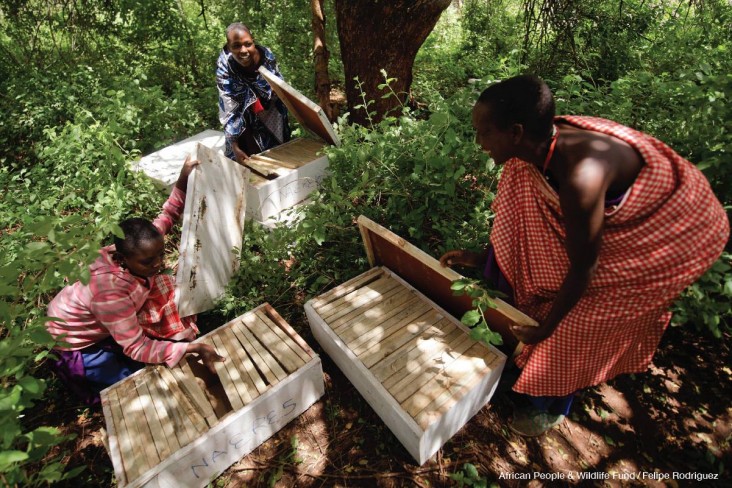
April 2017—Salome Mpongoliana was poor, lacked education, and had little control over her family’s finances. But when she joined a women’s group in Tanzania and discovered beekeeping, her fortunes began to change.
Mpongoliana is a member of Ngao, a 15-woman group in Loibor Siret village. A gracious woman with an easy smile, Mpongoliana is excited about the changes happening in her life.
“In a women’s group, you learn from one another and help each other out,” she explains. “You are not alone.”
As members of the nomadic Maasai tribe, these women lead a lifestyle increasingly under threat. While populations rise, Maasai herders are pitted against agricultural communities as both groups rely on the land to survive. Meanwhile, the natural resources they depend on are at risk of overuse. For such communities, it is critical to adopt alternative livelihoods that protect the land.
As an ecological, easy-to-maintain enterprise, beekeeping is an ideal solution.
Ngao first became involved in honey farming in 2014 through the Women’s Beekeeping Initiative, a USAID-supported effort under Tanzania People and Wildlife. A seminar for aspiring businesswomen introduced the idea to the group, so they applied for a grant. In no time, they were hanging 20 beehives, which they recently harvested for the first time. Together with other groups participating in the program, the women sell their product locally as well as under the Mama Asali, or “Mama Honey,” brand.
“I see a bright future after receiving money from the first harvest,” said Mpongoliana. “I will be able to better take care of my family. I can spend more on health care and save money.”
Better income isn’t the only advantage. As these women gain financial independence and contribute to their families’ livelihoods, they gain status and decision-making power within the community, with male peers beginning to see beyond women’s traditional household roles.
Beekeeping also benefits the community and surrounding environment. Instead of repaying grants with money, beneficiaries of the Women’s Beekeeping Initiative organize community conservation projects. The members of Ngao, for example, planted trees to protect local water storage tanks. They have also donated money to sick community members and the local primary school.
While honey profits benefit communities, the beehives are also protecting critical wildlife habitats. Under the Tanzania Beekeeping Act, villages are able to designate bee reserves, which prohibit the clearance of surrounding woodlands for fuel, agriculture, construction and other harmful practices. This ensures a home not only for the bees, but for any other wildlife that happen to share the same natural habitat. Just as importantly, local pastoralists can still access these lands for their cattle, goats and sheep.
As an undemanding enterprise that supports the community, protects local ecosystems, and builds gender equality, beekeeping is a perfect solution for women like Mpongoliana.Over 900 women from 50 women’s groups now access financial benefits from honey, while more than 700 beehives protect critical wildlife habitats.
Ever the entrepreneur, Mpongoliana remains on the lookout for ways to use her beekeeping income to pursue other business. “I will be able to use the profits to expand my petrol business and I have dreams of opening a bakery,” she explains. “We have learned to be courageous—not giving up or losing hope. This is important as an entrepreneur.”
USAID provides support to the Women’s Beekeeping Initiative under the Endangered Ecosystem–Northern Tanzania program. Through assistance to nine partner organizations—including Tanzania People and Wildlife—these efforts form a consortium dedicated to conserving Tanzania’s northern rangelands, which are home to key migration corridors, grazing areas, and world famous landscapes.
LINKS







Comment
Make a general inquiry or suggest an improvement.